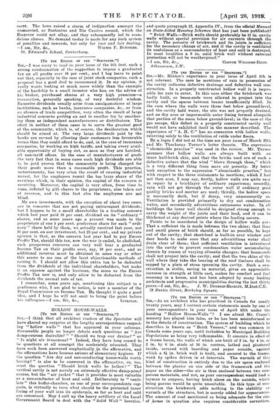[TO TILE EDITOR or VIE "131 , ZOTATOR."1 EIR, — I was sorry to
read in your issue of the 5th inst. such a strong condemnation of the suggestion to impose a graduated tax on all profits over 10 per cent, and I beg leave to point out that, especially in the case of joint stook companies, such a proposal has a good deal to recommend it. In my opinion, it really wants looking at much more widely than the example of the hardship to a small investor who has, on the advice of his broker, purchased shares at a very high premium—a transaction, generally speaking, of very doubtful wisdom. Excessive dividends usually arise from amalgamations of large institutions, such as banks, insurance ocunpanies, do., or from an absence of trade competition, very often the result of large industrial concerns putting an end to smaller fry by smother- ing them as independent manufacturers or distributors. The effect in neither of these cases is to serve the greatest good of the community, which ie, of course, the desideratum which should be aimed at. The very large dividends paid by the banks are earned by allowing their customers less favourable terms than they could afford to do, and, in the case of insurance companies, by working on high tariffs, and taking every avail- able opportunity of buying out, as soon as they are hatched, all non-tariff offices. In the ease of manufacturers of goods the very fact that in some cases such high dividends are able to be paid proves that the community is being charged for their goods more than a reasonable profit. This practice, unfortunately, has very often the result of causing industrial unrest, for the employees resent the too large share of the earnings which, in their opinion, the capital of the concern is receiving. Moreover, the capital is very often, from time to time, inflated by gift shares to the proprietors, also taken out of revenue, and to this fact also the employees are not blind.
My own investments, with the exception of about two cases, are in concerns that are not paying extravagant dividends; but I happen to be a small shareholder in a trading concern which last year paid 18 per cent. dividend on its " ordinary " shares, and as some years ago a present was made to the proprietors of one 5 per cent. preference share for each "ordi- nary" share held by them, we actually received last year, not 18 per cent on our investment, but 23 per cent., and my private opinion is that, as the concern last year had to pay Excess Profits Tax, should this tax, now the war is ended, be abolished, such prosperous concerns can very well bear a graduated. Income Tax on their profits over, say, 10 per cent., and as additional revenue must be obtained in some way or other this seems to me one of the least objectionable methods of raising it. I should not allow this extra tax to be deducted from the dividends of the individual shareholders, but make it an expense against the business, the same as the Excess Profits Tax now is, and only allow to be deducted from the dividends the normal rate of tax.
I remember, some years ago, mentioning this subject to a gentleman who, I am glad to notice, is now a member of the Royal Commission on Income Tax. He thought it quite a good idea, and I hope be will not omit to bring the point before






































 Previous page
Previous page